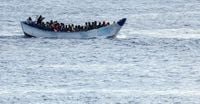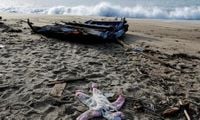Tragedy struck off the Tunisian coast on Wednesday, October 22, 2025, when a boat carrying migrants from sub-Saharan Africa capsized near the port of Mahdia. According to multiple news agencies, including the Associated Press and Shafaq News, at least forty people lost their lives in the disaster, among them several infants. Tunisian naval units managed to rescue thirty other migrants from the Mediterranean waters, but the heartbreak lingers in the air, as this incident marks one of the deadliest shipwrecks in Tunisian waters in recent years.
The ill-fated vessel, which departed from near Salakta—a coastal town southeast of Mahdia—was carrying seventy people, all reportedly seeking a better life in Europe. Walid Chtabri, spokesperson for the Mahdia court, confirmed to AFP that, "Initial investigations indicate that there were 70 people on board the vessel. Forty bodies, including infants, were recovered, and 30 people were rescued. They were all from countries in sub-Saharan Africa." That chilling number—forty lives lost in a single event—has shocked the region and reignited debates about the risks and realities facing migrants on the central Mediterranean route.
The prosecutor’s office in Mahdia wasted no time, launching an immediate investigation to determine the cause and circumstances of the sinking. Authorities are also probing whether the alert and rescue system functioned as it should have. As reported by Nova News, the Mahdia court’s Public Prosecutor’s Office is tasked with clarifying exactly what went wrong and whether anyone should be held responsible for the tragedy. The investigation will scrutinize the timeline of the rescue, the condition of the vessel, and the broader context of migration management in Tunisia.
This shipwreck is not an isolated incident. The central Mediterranean remains one of the world’s deadliest migration corridors. According to the International Organization for Migration (IOM), more than 32,800 people have been reported dead or missing on this route since 2014. Just this year alone, 961 people have perished in the central Mediterranean, including the victims of Wednesday’s disaster. The numbers are staggering, and each statistic represents a story cut short—a family’s hope dashed against the relentless waves.
Tunisia’s role in these perilous journeys has grown over time. The country’s coastline, just 145 kilometers from the Italian island of Lampedusa, has made it a key transit point for migrants from sub-Saharan Africa and beyond. As reported by AFP and the UN Refugee Agency, over 55,000 irregular migrants have arrived in Italy since the start of 2025, with nearly 4,000 departing from Tunisia. While the majority of these migrants set out from Libya, Tunisia’s significance as a departure point has only increased, especially as European Union migration policies have tightened and Libya’s own political situation remains unstable.
Efforts to stem the flow of migrants have been ongoing. In 2023, Tunisia signed a $290 million deal with the European Union—nearly half of which was earmarked to prevent boats from leaving Tunisian shores. Italy’s government, in particular, strongly supported the deal, hoping to reduce the number of arrivals on its southern coast. Despite these efforts, the number of departures remains high, and tragedies like Wednesday’s shipwreck continue to occur. The UN Refugee Agency notes that nearly 4,000 irregular migrants have reached Italy from Tunisia so far this year, underscoring the persistent demand and desperation driving these journeys.
The human cost of migration is not lost on the authorities or the international community. President Kais Saied of Tunisia has called on the IOM to accelerate voluntary returns of irregular migrants to their home countries, a move aimed at reducing the number of people attempting the dangerous crossing. April 2024 saw Tunisia formalize its Maritime Search and Rescue (SAR) Zone, a step long advocated by Italy to improve coordination and effectiveness of rescue operations in the central Mediterranean. The country also established a National Center for the Coordination of Search and Rescue Operations under the Ministry of Defense, centralizing interventions at sea and aiming to respond more swiftly to emergencies like Wednesday’s disaster.
Still, the question lingers: are these measures enough? The investigation into the Mahdia shipwreck will seek to determine whether the alert and rescue system failed to function promptly. As Nova News reports, the tragedy occurred just days after the presentation in Brussels of the new Pact for the Mediterranean, which will soon be submitted for political approval by the European Union and its southern Mediterranean partners, including Tunisia. The Pact’s priorities include strengthening regional cooperation, disaster preparedness, and a comprehensive approach to migration management—touching on voluntary repatriations, readmissions, and combating irregular immigration. The timing of the shipwreck, so close to the unveiling of this new initiative, has only heightened calls for urgent and effective action.
For many migrants, however, policy changes and international agreements offer little comfort. With the EU increasing efforts to curb arrivals, many irregular migrants find themselves stranded in Tunisia, caught between the hope of reaching Europe and the reality of tightened borders. The desperation that drives people to risk everything on a perilous sea journey is fueled by conflict, poverty, and instability in their home countries—forces that no single policy can easily address.
The tragedy off Mahdia’s coast is a stark reminder of the human stories behind the headlines. As the investigation unfolds, families across sub-Saharan Africa will be waiting for answers about their loved ones. The world, too, will be watching, hoping that lessons are learned and that future tragedies can be averted. In the meantime, the Mediterranean continues to claim lives, and the debate over migration—its causes, its consequences, and its solutions—remains as urgent as ever.
As dawn breaks over the port of Mahdia, the survivors of Wednesday’s shipwreck face an uncertain future. For the forty souls lost at sea, the journey is over. Their memory now joins the countless others who have perished on the central Mediterranean route, a somber testament to the risks migrants continue to take in search of hope and safety.



